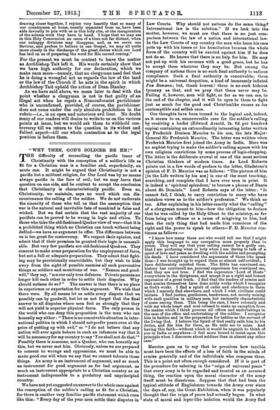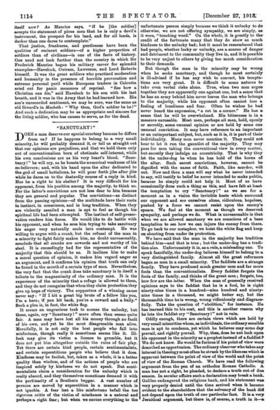"W HY THEN, GOD'S SOLDIER BE HE!" T HE difficulty of reconciling
the pacific tenor of Christianity with the conception of a soldier's life as fit for a Christian man is a familiar and, superficially, an acute one. It might be argued that Christianity is not a pacific but a militant religion, for Our Lord was by no means always pacific in the face of evil; but we may leave that question on one side, and be content to accept the conclusion that Christianity is characteristically pacific. Even so, Christianity, we maintain, says no word which can dis- countenance the calling of the soldier. We do not underrate the sincerity of those who tell us that the assumption that war is the natural and inevitable fate of mankind is false and wicked. But we feel certain that the vast majority of our pacifists can be proved to be wrong in logic and ethics. To those who take the old-fashioned Quaker view of war—that it is a prohibited thing which no Christian can touch without being defiled—we have no argument to offer. The difference between us is too great for controversy. We respect their opinion, and admit that if their premises be granted their logic is unassail- able. But very few pacifists are old-fashioned Quakers. They consent to make some preparation for the employment of force, but not a full or adequate preparation. They admit that fight- ing may be provisionally unavoidable, but they wish to hide away from the sight of possible enemies all such provocative things as soldiers and munitions of war. "Reason and good- will," they say, "are our only true defences. Private persona no longer kill each other in order to settle their disputes. Why should nations do so ? " The answer is that there is no place in experience or expectation for this argument. We wish that there were. By all means let us settle every dispute that we possibly can by goodwill, but let us not forget that the final answer to all disputes where men feel so strongly that they will not yield is superior physical force. The only person in the world who can deny this proposition is the man who can honestly say either : "There is no conceivable situation in inter- national politics in which I should not prefer peace even at the price of putting up with evil," or "I do not believe that any nation will ever again behave in such an infamous way that it will be necessary for my country to say You shall not do that." Possibly there is someone, not a Quaker, who can honestly say this, but we never met him. Obviously, unless we are prepared
to consent to wrongs and oppressions, we must be able to make good our will when we say that we cannot tolerate those things. An army is an instrument of argument, and as much an instrument for good argument as for bad argument, as much an instrument appropriate to a Christian country as an instrument indispensable to a predatory and unprincipled country.
We have not yet suggested an answer to the whole case against the conception of the soldier's calling as fit for a Christian, for there is another very familiar pacific statement which runs like this: "Every day of the year men settle their disputes in
Law Courts. Why should not nations do the same thing? International law is the solution." If we look into the matter, however, we must see that there is no just com- parison between the law of a nation and international law. In the Law Courts of any country the man who loses his case puts up with his losses or his humiliation because the whole force of the country will be exerted against him if he does not do so. He knows that there is no help for him. He may
not put up with his reverses with a good grace, but he has to accept them whatever they may be. But among the
company of nations there is no such final authority to enforce compliance. Such a final authority is conceivable ; there might be a universal despotism, a kind of immensely inflated Pale Romana ; but, thank heaven ! there is no such hideous tyranny as that, and we pray that there never may be. Failing it, however, men will fight, so far as we can see, to the end of the chapter, and it will be open to them to fight
just as much for the good and Christianlike causes as for contemptible and selfish ones.
Our thoughts have been turned to the logical and, indeed, as it seems to us, unanswerable case for the soldier's calling by receiving a leaflet (Edward Arnold, 2s. 6d. per hundred copies) containing an extraordinarily interesting letter written by Frederick Denison Maurice to his son, the late Major- General Sir Frederick Maurice. The letter was written when Frederick Maurice first joined the Army in India. Here was no sophist trying to make the soldier's calling square with his own religious convictions by some process of logic-chopping. The letter is the deliberate avowal of one of the most serious Christian thinkers of modern times. As Lord Roberts points out in a few words of preface to the letter, Gladstone's opinion of F. D. Maurice was as follows : "The picture of him [in the Life written by his son] is one of the most touching, searching, and complete that I have ever seen in print. It is indeed a spiritual splendour,' to borrow a phrase of Dante about St. Dominic." Lord Roberts says of the letter : "It cannot fail, I think, to carry conviction to many who have mistaken views as to the soldier's profession." We think so too. After explaining in his letter exactly what the "calling" of a clergyman meant to him—how the obligation to declare
that he was called by the Holy Ghost to the ministry, so far from being an offence or a cause of misgiving to him, had been the only thing that had made him conscious of the right and the power to speak to others—F. D. Maurice con- tinues as follows :— "I know how many there are who would tell me that I might apply this language to any occupation more properly than to yours. They will say that your calling cannot be a godly one, that I am profaning what is holy when I am daring to talk of a spirit of love and peace as dwelling with the soldier and prompting his deeds. I have considered the arguments of those who speak thus—I was brought up to regard them as almost self-evident; I have deliberately rejected them. The Bible has convinced me, history has convinced me, personal experience has convinced me, that they are not true. I find the expression Lord of Hosts' everywhere in the Scriptures, and accept it as a right and honest expression of a great truth. I find that the leaders of armies and that armies themselves have done nobly works which I recognize as God's works. I find a spirit of order and obedience in them which I scarcely find elsewhere, and which I wish civilians could imitate. I find justice, gentleness, tenderness, not merely mixing with such qualities in military men, but eminently characteristic of some among them. This being the case, I have solemnly and with my whole heart and soul refused to make an exception front the maxim which I think governs all offices and undertakings in the case of the office and undertaking of the soldier. I recognize him in battles and in the preparation for battles as the servant of the living God. I believe the Spirit of God really calls him to his duties, and fits him for them, as He calls me to mine. And having this faith—without which it would be anguish to think of you in India or anywhere—I feel more bound to insist upon this principle when I discourse about soldiers than in almost any other case."
Maurice goes on to say that he perceives bow terrible must have been the effects of a loss of faith in the minds of armies generally and of the individuals who compose them. This is a point not often enough considered. If it is part of the procedure for ushering in the "reign of universal peace" that every army is to be regarded and treated as an accursed thing, the reaction upon the moral character of the army itself must be disastrous. Suppose that that had been the typical attitude of Englishmen towards the Army ever since the days of, say, the Great Exhibition, when it was popularly thought that the reign of peace had actually begun. In what state of moral and leper-like isolation would the Army find itself now P As Maurice says, "if he [the soldier] accepts the statement of pious men that he is only a devil's instrument, the prospect for his land, and for all lands, is darker than one dares to contemplate."
That justice, frankness, and gentleness have been the qualities of eminent soldiers—of a higher proportion of soldiers than of civilians—is one of the facts of history. One need not look further than the country in which Sir Frederick Maurice began his military career for splendid examples—Havelock, Outram, Lawrence, and Lord Roberts himself. It was the great soldiers who practised moderation and humanity in the presence of horrible provocation and extreme personal peril while European traders in Calcutta cried out for panic measures of reprisal. "See how a Christian can die," said Havelock to his son with his last breath, and it was in the Army that he had learned how. His son's unrecorded sentiment, we may be sure, was the same as old Siward's in Macbeth : "Why then, God's soldier be he !" And such a dedication may be as appropriate and sincere for the living soldier, who has causes to serve, as for the dead.



































 Previous page
Previous page